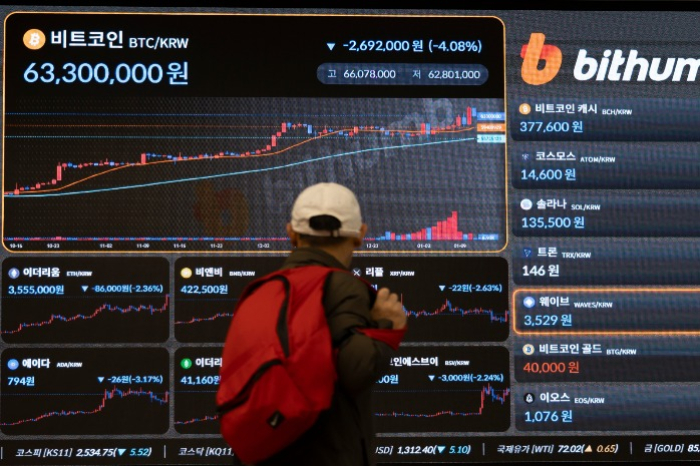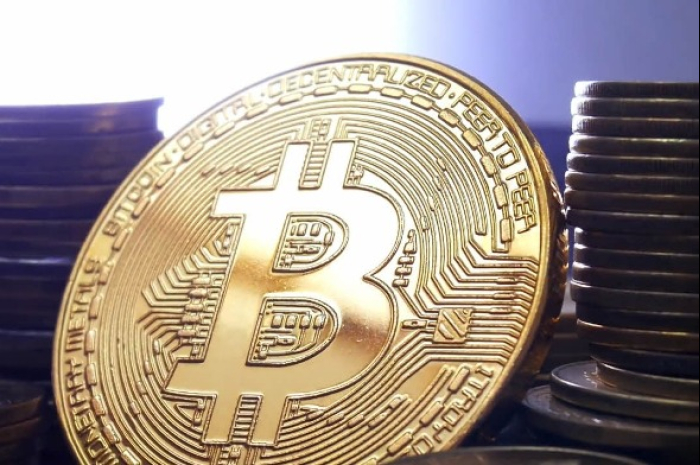The KED View
Yes to cannabis but no to bitcoin?
Investors in S.Korea are baffled amid an absence of clear guidelines on ETF trading after the country’s ban on spot bitcoin ETFs
By Jan 16, 2024 (Gmt+09:00)
3
Min read
Most Read
LG Chem to sell water filter business to Glenwood PE for $692 million


KT&G eyes overseas M&A after rejecting activist fund's offer


Kyobo Life poised to buy Japan’s SBI Group-owned savings bank


StockX in merger talks with Naver’s online reseller Kream


Meritz backs half of ex-manager’s $210 mn hedge fund



Aftershocks continue in the South Korean financial market following the country’s financial regulator’s ban on the trading of spot bitcoin exchange-traded funds (ETFs), which have been approved in the US.
“If banks invest in bitcoin, a financial crisis would be inevitable whenever the digital asset market jitters,” a Korean financial authority official said on the same day the Financial Services Commission (FSC) blocked the trading of US spot bitcoin ETFs in the country.
What the official meant was that authorized investment in highly volatile assets like bitcoin will undermine financial institutions’ financial soundness.
Another official echoed the concern, saying that investors in Korea where virtual asset investment is already excessively active will flock to pick up spot bitcoin ETFs “like moths to a flame.”
Reflecting such concerns, the FSC immediately announced a ban on Korean retail investors’ trading of the first US spot bitcoin ETFs on the same day that the US Securities and Exchange Commission (SEC) gave the nod to the novel financial product that holds bitcoin to be sold to the public last week.
A day later, the Korean financial regulator issued a press release, warning that Korean securities firms’ trading of foreign country-listed spot bitcoin ETFs for their local clients could violate Korea’s Capital Markets Act, which does not classify cryptocurrencies, including bitcoin, as a legitimate underlying asset for ETFs.
The authorities’ concerns about a possible speculative frenzy in cryptocurrencies and violation of the law are clear.
However, considering the Korean financial authorities have almost never disallowed or suspended trading of foreign country-listed ETFs before, their latest stance on spot bitcoin ETFs is creating confusion at Korean securities firms.

LACK OF CONSISTENCY
In Korea, it is legal to trade the Pure US Cannabis ETF (MSOS), which is the first ETF to offer US-exclusive cannabis exposure, although cannabis cultivation and consumption is illegal in the country, where its use is also widely considered morally unacceptable.
Still, in Korea it is legal to invest in an individual company that cultivates and sells cannabis products.
A local securities firm broker questioned whether Korean financial authorities have ever reviewed the legitimacy of the cannabis ETFs.
“It looks like we have to check the legality of individual ETFs listed on overseas markets every time we want to trade them,” the official complained.
It is also ironic that the financial authorities are okay with trading riskier and more volatile financial products such as offshore futures and options that are highly leveraged. Their local transactions amount to trillions of dollars annually.
UNDERMINES INVESTMENT DIVERSITY

In the capital market, investment diversification is key to market competitiveness.
The authorities’ crackdown on already active investment demand will only manipulate the market.
Some people are even worried that strict regulations will lead gray markets for cryptocurrencies to spring up.
The Korean financial authorities also lack a systematic regulation process, leaving the local securities industry and investors in chaos.
Following Korea's abrupt ban on trading of US spot bitcoin ETFs, major Korean securities firms have hastily suspended their years-long trading of spot bitcoin ETFs listed in Canada and Germany.
Although bitcoin futures ETFs are allowed to be traded in Korea, some brokerage houses have also decided to cease trading them.
Write to Hyeong-Gyo Seo at seogyo@hankyung.com
Sookyung Seo edited this article.
More to Read
-
 CryptocurrenciesForeign-listed bitcoin ETF trading suspended in S.Korea
CryptocurrenciesForeign-listed bitcoin ETF trading suspended in S.KoreaJan 12, 2024 (Gmt+09:00)
3 Min read -

-
 CryptocurrenciesCrypto investors threaten Terraform founders with class-action lawsuit
CryptocurrenciesCrypto investors threaten Terraform founders with class-action lawsuitMay 17, 2022 (Gmt+09:00)
3 Min read
Comment 0
LOG IN


